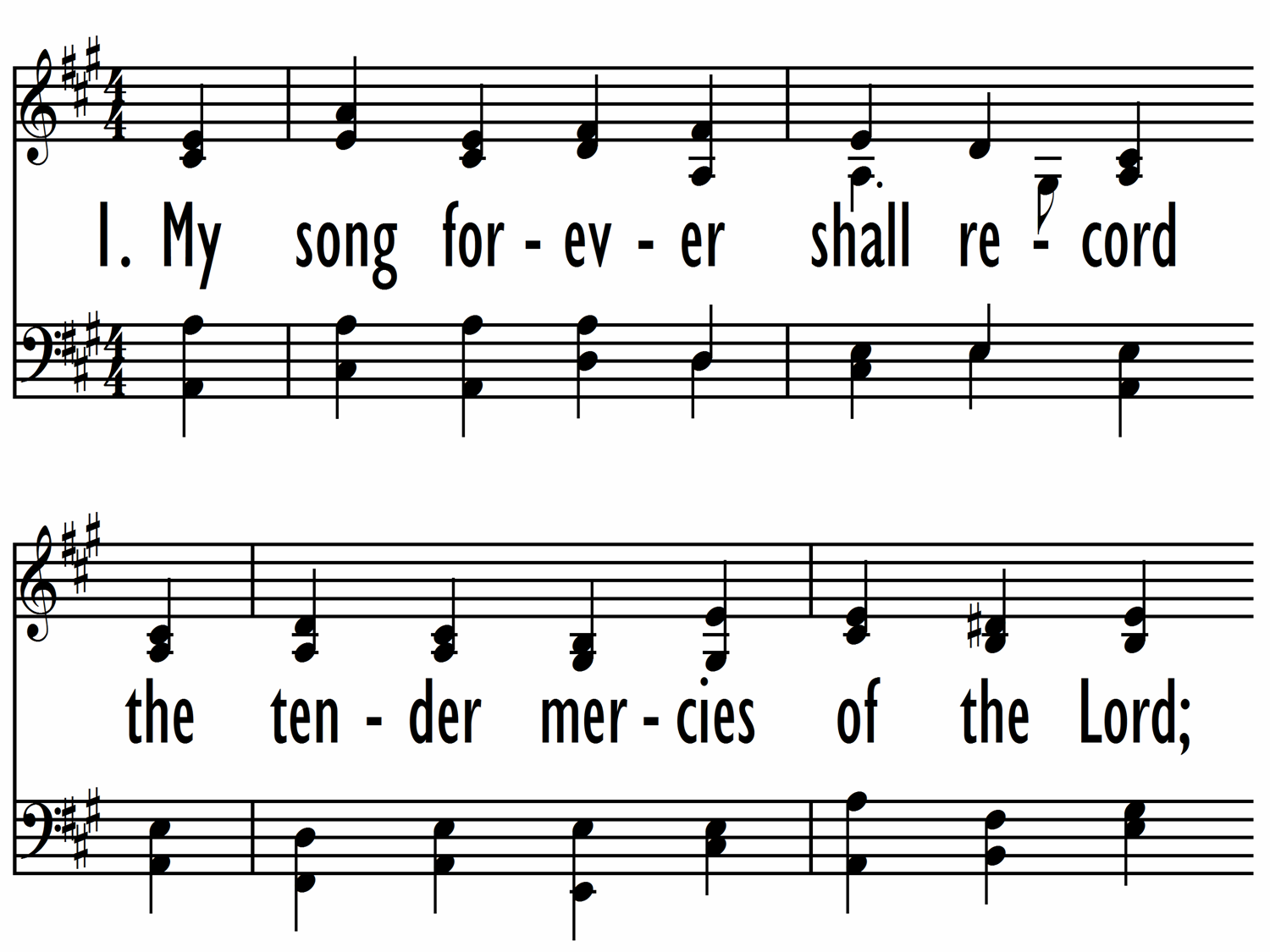- |
User Links
280
My Song Forever Shall Record
Hymn Information
- First Line
- My song forever shall record
- Text Source
- <cite>Psalter</cite>, 1912, alt.
- Tune Name
- WINCHESTER NEW
- Tune Source
- <i>Musikalisches Hand-buch</i>, Hamburg, 1690
- Topic
- Culture, Community & Nation · God's: Mercy
Copyright Information
- Text Copyright
- Public Domain
- Tune Copyright
- Public Domain
- Reprint/Projection Information
- Words and Music: The Words and Music are in the Public Domain; you do not need permission to project or reprint the Words and Music.
Full Text
Scripture References
Thematically related:
- st. 1 =
- st. 2 =
- st. 3 =
- st. 4 =
- st. 5 =
Further Reflections on Scripture References
This paraphrase is taken from the psalm's first section, its hymn of praise. Stanzas 1 and 2 extol God's mercy and faithfulness, which he displays to his people at all times and in all places. Stanza 3 and 4 witness to the biblical cosmology in which God's justice and love are to be the model for the lifestyle of his people. The final stanza is a doxology.
Psalter Hymnal Handbook
280
My Song Forever Shall Record
Additional Prayers
Faithful God, you are the same yesterday, today, and forever.
Your Word remains true, your love remains constant;
your plan and purpose stand unaltered.
Remember us in our present distress.
By the power of your Holy Spirit make us ready and willing to live this day for you.
We pray this through the power of Jesus’ name. Amen.
Your Word remains true, your love remains constant;
your plan and purpose stand unaltered.
Remember us in our present distress.
By the power of your Holy Spirit make us ready and willing to live this day for you.
We pray this through the power of Jesus’ name. Amen.
—
Psalms for All Seasons (http://www.psalmsforallseasons.org)
280
My Song Forever Shall Record
Tune Information
- Name
- WINCHESTER NEW
- Key
- A Major
- Meter
- 8.8.8.8
Recordings
280
My Song Forever Shall Record
Hymn Story/Background
Originally published in the 1912 Psalter; this text is a paraphrase of select verses from Psalm 89. That psalm unites a great hymn of praise for God's faithfulness, particularly to David and his dynasty, and a prayerful lament for the downfall of Israel.
This paraphrase is taken from the psalm's first section, its hymn of praise. Stanzas 1 and 2 extol God's mercy and faithfulness, which he displays to his people at all times and in all places. Stanza 3 and 4 witness to the biblical cosmology in which God's justice and love are to be the model for the lifestyle of his people. The final stanza is a doxology.
The original version of WINCHESTER NEW appeared in Musikalisches Handbuch der geistlichen Melodien, published in Hamburg, Germany, in 1690 by Georg Wittwe. It was set to the text “Wer nur den lieben Gott.” An expanded version of the tune was a setting for "Dir, dir Jehova" in Johann Freylinghausen's Geistreiches Gesangbuch (1704). The melody was also used by John and Charles Wesley for their texts and was reworked by William J. Havergal as a long-meter tune in his Old Church Psalmody (1864). Havergal's version closely resembled its original 1690 form. Named for the ancient English city in Hampshire noted for its cathedral, the tune gained much popularity because of its extended use. It is called WINCHESTER NEW (also called CRASSELIUS) to distinguish it from WINCHESTER OLD.
Sing this dignified psalm tune in unison on the outer stanzas and in parts on the middle ones. Use solid organ tone and phrase in two long lines.
—
Bert Polman
Author Information
The 1912 Psalter was the first ecumenical psalter published in the United States and the most widely used metrical psalter of the twentieth century in North America. The United Presbyterian Church invited all other Reformed and Presbyterian denominations to join them in the effort to provide a new versifications of the psalms; six Presbyterian denominations, as well as the Christian Reformed Church and the Reformed Church in America joined in the effort in revising the 1887 Psalter (whose texts actually dated back to the 1871 Book of Psalms; the 1887 edition had added music to the texts.). The 1912 Psalter included all the psalms in 413 settings, eight doxologies, and the three Lukan canticles (Song of Mary, Song of Zechariah, and Song of Simeon).
—
Bert Polman
Suggestions or corrections? Contact us


 My Starred Hymns
My Starred Hymns






